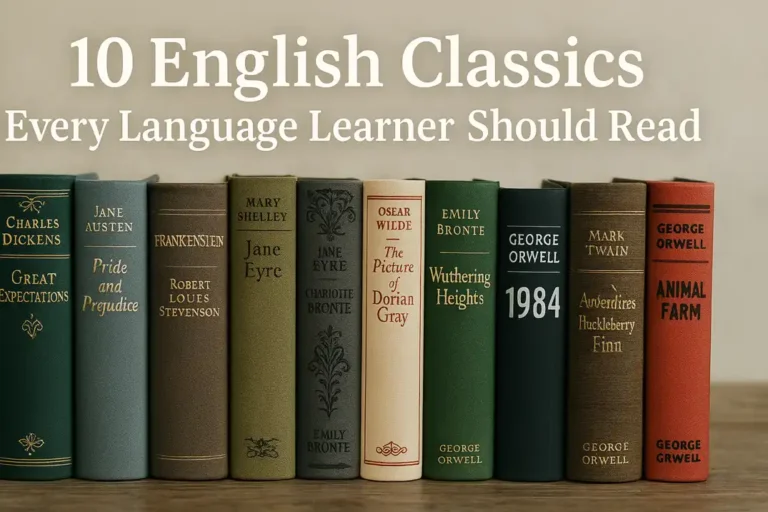How Reading Literature Builds Your English Skills Naturally
English classics are not just books—they’re your secret weapon to becoming a confident English speaker. From the rhythm of beautiful language to the structure of thoughtful sentences, reading these books helps you absorb English in a natural, lasting way.
📚 Why It Works:
When you read classic English novels, you’re not just memorizing words—you’re experiencing how native speakers use them in context. You’ll discover how questions are formed, how characters express emotions, and how humor or sarcasm is communicated.
✨ Immersive Learning:
Reading timeless English books like Pride and Prejudice or The Adventures of Sherlock Holmes exposes you to different tones, grammar forms, and vocabulary—all without feeling like you’re studying.
🎭 Characters Teach Expression:
One minute you’re laughing with Mr. Bennet’s dry wit, the next you’re learning formal language from Jane Eyre. These stories introduce styles that reflect real-life conversation.
📘 Real Example: My student Diego from Argentina started reading The Secret Garden. After a month, he naturally started saying things like, “I suppose so,” and “It’s rather lovely, isn’t it?”—phrases straight from famous English literature.
Want to speed things up with tech, too? Check out What Is EasySpeak How It Helps You Learn English Faster for a digital boost.
Table of Contents
Essential Elements That Make English Classics Timeless
So what gives English classics their magic? Why do we keep coming back to these books, even after 100 years? It’s not just nostalgia—it’s because they’re built on powerful storytelling, emotional truth, and language that lasts.
🕰️ Themes That Don’t Expire:
Whether it’s love, ambition, injustice, or human curiosity, the themes in must read English books are still totally relevant. This makes reading feel personal, even across cultures.
📝 Language That Stays With You:
Authors like Charles Dickens or George Orwell knew how to turn ordinary words into art. As you explore English literature classics, you’ll start noticing how metaphors, imagery, and rhythm shape your understanding of English.
📖 Structure That Teaches:
The grammar in classic English novels is rich but clear. You’ll encounter different sentence styles, punctuation uses, and even how authors create emphasis without bold fonts or emojis!
📘 Real Example: Rina from Korea read Animal Farm and suddenly understood political metaphors—and started using more complex sentence patterns when speaking.
To explore easier language pathways too, check out 5 Easiest Languages to Learn for Spanish Speakers in 2025.
Need help with professional English? Visit Master Business English in 2025: Vocabulary, Idioms, and Conversations for focused language tips.

Top 3 English Classics That Are Surprisingly Easy to Understand
Not all English classics are difficult! In fact, some are incredibly beginner-friendly, with stories so engaging you’ll forget you’re even reading in another language.
🟢 1. The Little Prince by Antoine de Saint-Exupéry (English translation)
Simple language, deep messages. Great for vocabulary building and understanding abstract English phrases.
🌼 2. Charlotte’s Web by E.B. White
Written for children but emotionally rich. Ideal for learning family-related vocabulary and descriptive words.
🕵️ 3. The Curious Case of Benjamin Button by F. Scott Fitzgerald
Short, fascinating, and full of timeless English books vocabulary that pops up in everyday conversations.
💡 Real Example: Tomoko from Japan read Charlotte’s Web to her daughter and found herself confidently using words like “terrific” and “radiant” in real life.
Curious about grammar patterns? Read Speak Past Participle Explained With Easy Examples to keep improving.
Books That Teach More Than English—Culture, History, and Humor
Reading English classics helps you learn more than just grammar or vocabulary—it’s a window into the culture and values behind the language.
🎨 Cultural References:
Many English literature classics reflect the norms, expectations, and beliefs of their time. Books like Great Expectations or Emma teach you how British society used to work—and how that influences modern behavior.
📆 Historical Insight:
By reading classic English novels, you’ll better understand historical events, social issues, and even how language changes over time.
😂 Humor and Irony:
British humor can be dry and subtle. Stories like The Importance of Being Earnest will show you how jokes work in English—and why people laugh!
📘 Real Example: Fatima from Egypt said that after reading Pride and Prejudice, she not only improved her vocabulary but also started picking up on jokes in English movies.
Still getting tripped up by pronunciation? Don’t miss 10 Hard Words to Pronounce in English for Spanish Speakers.
Want to dive deeper into how English came to be? Here’s the story of the english language.

Modern Adaptations That Help You Enjoy English Classics Today
Worried that English classics will be too hard or too slow? Don’t worry—modern technology and adaptations make them much more accessible!
📺 Watch the Movie First:
There are amazing films and series based on famous English literature. Watch Jane Eyre or Little Women before reading—the story will be easier to follow.
🎧 Listen While You Read:
Use audiobooks while reading your must read English books. Hearing the correct pronunciation helps your brain match written words with spoken ones.
📱 Try Simplified Versions:
Many publishers offer beginner editions of English literature classics with easier vocabulary and grammar.
📘 Real Example: Ali from Turkey used a graphic novel version of Dracula to get into reading—and now he’s tackling the full version confidently.
Want more modern resources? Check out 7 Best English Conversation Books for Everyday Speaking for easy conversation practice.
Tips to Read Difficult Classic English Novels Without Getting Lost
Some English classics are challenging, yes—but that doesn’t mean you should avoid them. Here’s how to stay motivated and actually enjoy the process:
🔍 Read in Small Chunks:
Don’t try to finish the book in one weekend. Read a chapter a day and focus on what you understand.
📓 Keep a Vocabulary Journal:
Write down new words or expressions. Look them up later and try to use them in sentences.
🧩 Use Chapter Summaries:
Before starting a new chapter in classic English novels, read a short summary so you don’t get lost.
💬 Real Example: Javier from Colombia kept a “new words notebook” while reading timeless English books and improved his speaking confidence in just two months.
How to Choose the Right English Classic Based on Your Language Level
Ready to start reading? Here’s how to pick the best English classics for your current skills—so you don’t feel frustrated or bored.
🔰 Beginner Level:
Try illustrated or simplified versions of must read English books like Alice in Wonderland or A Christmas Carol.
🔄 Intermediate Level:
Look for short story collections from English literature classics, such as The Gift of the Magi or The Happy Prince.
🔝 Advanced Level:
Challenge yourself with full-length classic English novels like Jane Eyre, 1984, or Brave New World.
📘 Real Example: Andre from Brazil started with easy retellings but is now confidently reading full Brontë novels!
Need a hand choosing your first classic? Just Contact Us—we’ll help you find the perfect book for your level!

How an ESL Tutor Can Help You Speak English Better
Discover how an esl tutor supports speaking practice, grammar improvement, and confidence building for all levels.

Best Podcast en Ingles to Improve Your Listening Skills
Find the top podcast en ingles that help learners understand real conversations, improve vocabulary, and enjoy English.

What Color Is English Class and Why It Feels Right
Wondering what color is english class Explore how color themes help students emotionally connect with the subject better.
